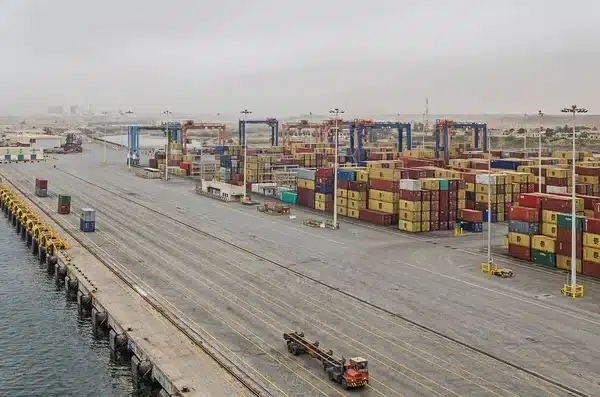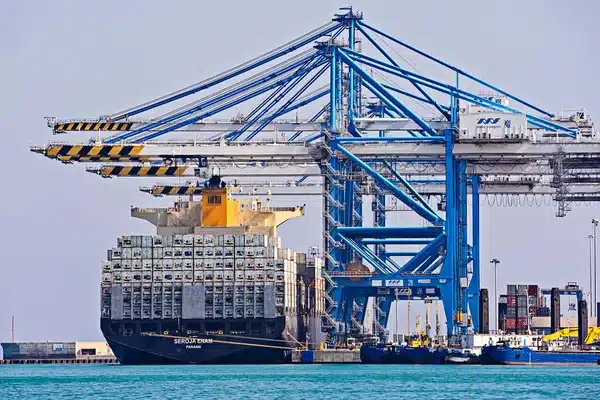Reliable & Cost-Effective Shipping from China
Tailored Logistics Solutions for Your Business
- Home
- »
- Industry News
- »
- Saudi Arabia’s 11 Major Ports: A Complete Guide
Saudi Arabia’s 11 Major Ports: A Complete Guide
- L. Liu
Saudi Arabia, strategically located between Europe, Asia, and Africa, plays a pivotal role in global trade. Its extensive coastline along the Red Sea and the Arabian Gulf hosts some of the world’s most significant ports, which are vital for international commerce and the Kingdom’s economic diversification goals under Vision 2030.
This guide provides an in-depth look at Saudi Arabia’s 11 major ports, detailing their capacities, facilities, and contributions to global trade. Whether you’re a logistics professional, business owner, or maritime enthusiast, this article offers valuable insights into Saudi Arabia’s port infrastructure.

Jeddah Islamic Port
Overview
Located on the Red Sea, Jeddah Islamic Port is the largest and busiest port in Saudi Arabia, handling more than 65% of the country’s imports. Established in 1976, it serves as a critical hub for both commercial and transshipment activities.
Key Features:
Annual Capacity: Over 6 million TEUs.
Facilities: Equipped with modern container terminals, bulk cargo terminals, and facilities for handling vehicles and livestock.
Connectivity: Links to major global trade routes and serves as a primary gateway for goods entering the Kingdom.
Technology Integration: Advanced tracking systems and automated cargo handling equipment enhance efficiency.
Significance:
Jeddah Islamic Port is critical for the Kingdom’s trade with Europe, Asia, and Africa. Its strategic location makes it a hub for transshipment activities, particularly for goods moving between the Suez Canal and the Indian Ocean.
King Abdullah Port
Overview
Situated in King Abdullah Economic City, this privately-operated port is one of the fastest-growing in the world. It supports the Kingdom’s goal of becoming a leading global logistics hub.
Key Features:
Annual Capacity: 5 million TEUs (with expansion plans).
Specialized Terminals: Includes state-of-the-art container terminals and facilities for bulk and general cargo.
Technological Advancements: Fully automated operations for efficient cargo handling and faster turnaround times.
Green Initiatives: The port integrates environmentally friendly technologies to reduce emissions and energy consumption.
Significance:
King Abdullah Port plays a crucial role in easing congestion at Jeddah Islamic Port and supporting the economic ambitions of Vision 2030. It is a preferred choice for businesses seeking streamlined logistics solutions.
Dammam’s King Abdulaziz Port
Overview
Located on the Arabian Gulf, this port is a key entry point for goods heading to Saudi Arabia’s eastern and central regions. It is the Kingdom’s largest port on the Arabian Gulf.
Key Features:
Annual Capacity: Over 1.8 million TEUs.
Specialization: Handles containers, bulk cargo, and general cargo.
Connectivity: Directly linked to the Kingdom’s extensive railway network, enabling seamless inland transportation.
Innovation: Recent upgrades include smart port solutions and enhanced digital customs processing.
Significance:
As the primary port on the Arabian Gulf, King Abdulaziz Port supports trade with Gulf Cooperation Council (GCC) countries and facilitates the import of machinery, electronics, and raw materials.

Yanbu Commercial Port
Overview
Located on the Red Sea, Yanbu Commercial Port primarily supports the industrial complexes in Yanbu Industrial City. It also serves as a gateway for oil and gas exports.
Key Features:
Facilities: Terminals for containers, bulk cargo, and liquid cargo.
Annual Capacity: Over 10 million tons of cargo.
Infrastructure: Modernized berths and storage facilities to handle diverse cargo types.
Significance:
Yanbu Commercial Port is critical for exporting petrochemical products and industrial materials. It also supports the import of essential commodities for the nearby industrial zones.
Jubail Commercial Port
Overview
Serving Jubail Industrial City, this port supports Saudi Arabia’s petrochemical and energy sectors. It is among the most important industrial ports in the Middle East.
Key Features:
Specialization: Handles industrial cargo, chemicals, and general goods.
Connectivity: Integrated with industrial facilities in Jubail and connected to major regional highways.
Capacity: Designed to accommodate large tankers and specialized vessels.
Significance:
Jubail Commercial Port is vital for exporting Saudi Arabia’s petrochemical products to global markets. It also facilitates imports of raw materials needed for industrial production.
Ras Al-Khair Port
Overview
This industrial port supports mining and mineral exports, located near Jubail. It is a centerpiece of Saudi Arabia’s growing mining sector.
Key Features:
Specialization: Handles bulk cargo, including phosphate, aluminum, and other minerals.
Facilities: Advanced equipment for large-scale mineral exports and storage.
Sustainability: Implements eco-friendly practices in port operations.
Significance:
Ras Al-Khair is crucial for Saudi Arabia’s ambitions to become a leading player in the global mining industry.
Al Lith Port
Overview
Located south of Jeddah, Al Lith Port primarily serves the fishing industry and small-scale cargo operations.
Key Features:
Facilities: Basic infrastructure for handling general cargo and fishing vessels.
Local Significance: Supports regional economic activities and connects smaller communities to trade networks.
Significance:
Though smaller in scale, Al Lith Port supports local economic activities and serves as a vital node for regional trade.
Jizan Port
Overview
Situated near the southern border, Jizan Port supports trade with neighboring countries and regional industries.
Key Features:
Specialization: Handles agricultural products, general cargo, and livestock.
Facilities: Terminals for bulk cargo and containers, with plans for expansion.
Significance:
Jizan Port facilitates trade with Africa and Yemen, contributing to regional development and humanitarian logistics.
Dhuba Port
Overview
Located on the northern Red Sea coast, Dhuba Port serves northern Saudi Arabia and nearby countries.
Key Features:
Facilities: General cargo and container handling terminals.
Annual Capacity: Approximately 4 million tons of cargo.
Proximity: Strategically located near Jordan and Egypt.
Significance:
Dhuba Port is strategically important for regional trade, including connections to major markets in the Levant.

Ras Tanura Port
Overview
One of the largest oil export terminals in the world, Ras Tanura is a cornerstone of Saudi Arabia’s energy sector.
Key Features:
Specialization: Exclusively handles crude oil and petroleum products.
Facilities: Advanced infrastructure for oil tankers and massive storage capacity.
Significance:
Ras Tanura Port is vital for global energy supply chains, exporting billions of barrels annually to international markets.
Ras Al-Mishab Port
Overview
Located in the northern Gulf, Ras Al-Mishab serves both military and commercial purposes.
Key Features:
Facilities: Handles general cargo, military supplies, and oil equipment.
Strategic Role: Supports defense logistics and industrial activities.
Significance:
The port is essential for Saudi Arabia’s strategic and industrial needs, serving both civilian and military purposes.
Comparative Analysis of Saudi Arabia’s Ports
| Port | Specialization | Annual Capacity | Strategic Importance |
|---|---|---|---|
| Jeddah Islamic | General cargo, containers | 6+ million TEUs | Gateway for Red Sea trade |
| King Abdullah | Containers, bulk cargo | 5+ million TEUs (planned) | Vision 2030 logistics hub |
| King Abdulaziz | General, containers | 1.8+ million TEUs | Gulf region trade |
| Ras Al-Khair | Minerals | Large-scale bulk handling | Mining industry support |
| Jubail Commercial | Petrochemicals, general | High industrial capacity | GCC energy sector |
Saudi Arabia’s 11 major ports are pivotal to its economic growth and global trade connections. From Jeddah Islamic Port’s massive throughput to Ras Tanura’s energy exports, these ports exemplify the Kingdom’s strategic maritime capabilities.
By understanding the unique features and roles of each port, businesses can optimize their logistics and tap into the vast opportunities Saudi Arabia offers. Partner with Tonlexing for tailored logistics solutions that simplify your shipping needs in this dynamic region.

